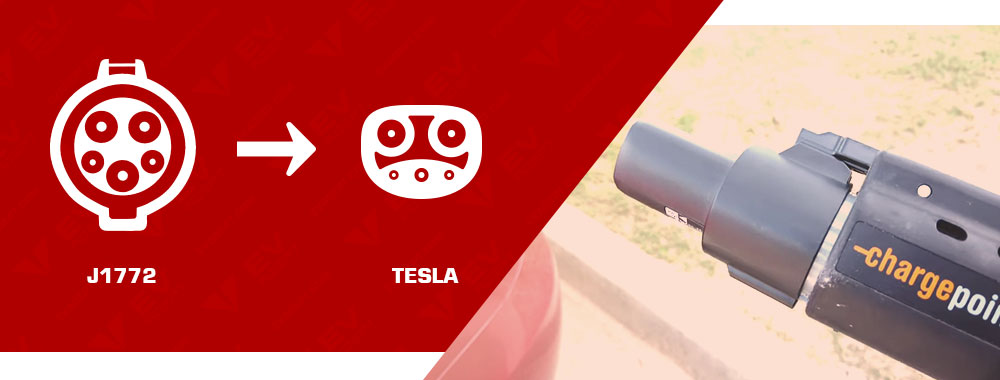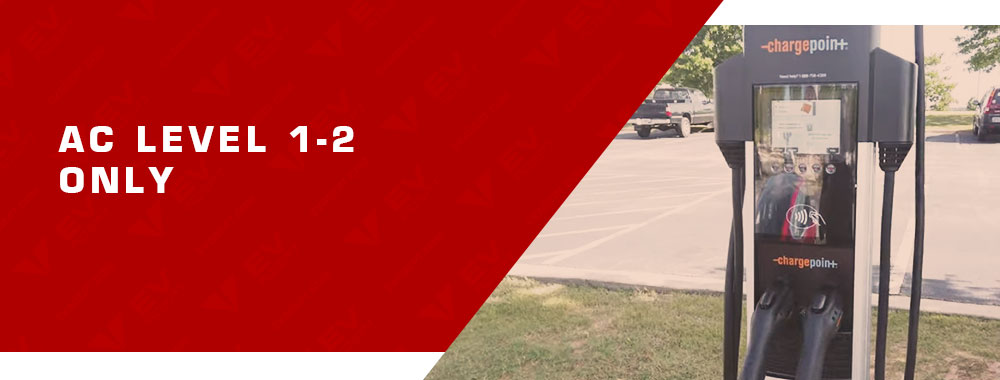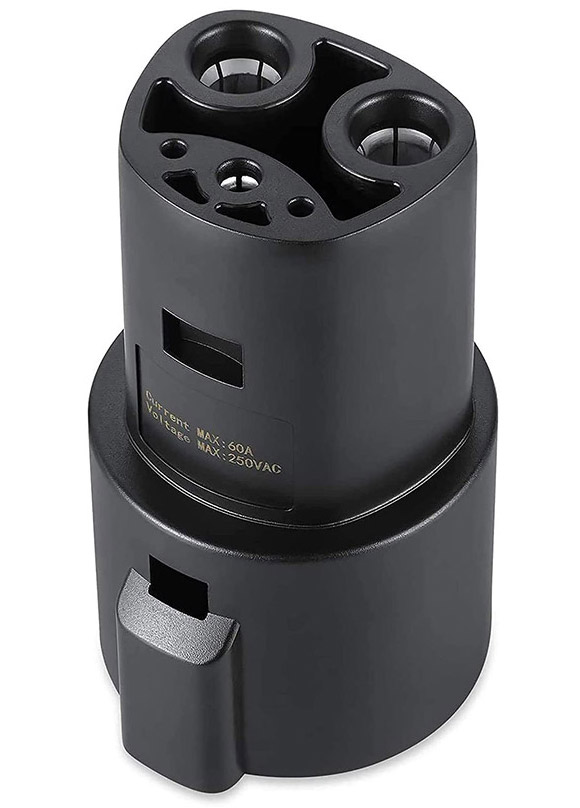As the number of Tesla electric cars has grown, lines at some Supercharger charging stations have grown. Other slower charging stations called Tesla Destination can be occupied by electric cars (e.g. Nissan) from other manufacturers thanks to the Tesla to J1772 adapter. So how do we Tesla owners charge a car at another Level 2 station if our connector is not there? That’s where the J1772 adapter for Tesla comes in.
OEM J1772 for Tesla is already included with any car
Perhaps the owner of a new Tesla car knows that he has a home charger and an adapter J1772 for his Tesla in his trunk. In addition to the aforementioned ability to charge in Level 2 charging station networks (EVSE) with the adapter, there are times when it is necessary to use it with home devices. If if should happens that an adapter is lost or an additional one is needed, then this review on selecting an adapter will explain all the details.

Among EV Adept’s customers are families with electric cars from different manufacturers, and the universal charger (Wall Mounted type) more often has the J1772 plugin. And that, as we know, is not directly supported by Tesla. This is where a J1772 to Tesla adapter comes in.
A good adapter will be compatible with all Tesla models (the USA and Canada)
- Model 3
- Model Y
- Model S
- Model X
Not compatible with European versions of Tesla with CCS charging ports.
What features should the best adapter have?
- 40A-60A
- 240V AC
- Frost-resistant -22°F (-30°C)
- Heat-resistant 122°F (50°C)
- IP54 water resist
Charging speed when charging Tesla at non-Tesla stations
| Tesla Model X | Tesla Model Y | Tesla Model S | |
|---|---|---|---|
| VOLTA • 9.6KW OUTPUT (AC) | 28 mi/h | 37 mi/h | 34 mi/h |
| ELECTRIFY AMERICA • 7KW OUTPUT (AC) | 21 mi/h | 33 mi/h | 25 mi/h |
| BLINK • 7.7KW OUTPUT (AC) | 23 mi/h | 37 mi/h | 28 mi/h |
Use a calculator to calculate other specifications.

J1772 adapter and fast charging
Unfortunately, the type of connector used in the adapter, J1772, assumes only AC use for Level 1 and Level 2 stations (it is mentioned in the blogs). If you need to charge your Tesla in public DC networks such as ChargePoint with fast charging, the CCS to Tesla adapter is the way to go. Even though the CCS connector is partially similar to J1772, you can’t use it with Level 1 and 2 chargers.
Which adapter should I buy and where?
In testing among EV Adept customers, non-original models of adapters were observed to have dimensional problems. Such adapters are simply stuck in the port for Tesla users. In other non-certified models, the resistance was different from the original reference.
The choice among our customers is the OEM adapter, which you can see it on the official website or among other offers.
If you are a fan of fast delivery, then pay attention to the following worthy alternative. From our customers’ experience, we can also confidently call Lectron a good model. The allowable current is 60A as opposed to the original (40A). If the 20 amp difference is not so relevant for the current Level 2 chargers, it may well be in demand shortly.
What can the Lectron adapter do?
- Supports speeds up to 19kWh
- Compatible with most Level 1 and 2 (home and network EVSE)
Which home charging stations the Lectron adapter is compatible with?
- Lectron Level 2 (tested)
- ChargePoint (tested)
- Grizzl-E (tested)
- JuiceBox (tested)
- Siemens (tested)
- Eaton
- Blink
- and other Level 1-2 EVSE
If the question of choosing an EV home station has not yet been solved, then look closely at high power stations, even if your car has limits on current reception. The charger will be relevant for the future lineup of electric cars.
Which public charging networks the adapter is compatible with?
- VOLTA
- BLINK
- CHARGEPOINT
- ELECTRIFY AMERICA
- EVGO
EV Adapt adapters were tested in these networks by EV Adept customers. In other networks with J1772 plug-ins, we see no obstacles to using the same adapter to charge your Tesla.
How to use it?
Connect the adapter to the charger connector, then plug the adapter into the Tesla charging port.
FAQ
How does using an adapter affect amperage? Does the adapter reduce the charging time of an electric car?
The additional part in the electrical connection increases the possibility of malfunctions. With our measurements, the resistance increases only slightly, which has a negligible effect on the charging rate (<0.02%). However, this only applies to the certified J1772 adapters recommended in this article.
Can I use the adapter with home charging stations?
Of course, you can use the adapter in public charging networks as well as at home, even with the J1772 extension cord for the charger.
Will I be able to use the fast charger for my Tesla with the J1772 adapter?
J1772 only involves Level 2 charging with alternating current. Constant current stations (fast charging) use the CCS standard. This is a different kind of adapter and is sold in the USA. Read more in this article.
Will OCPP data transfer between EVSE and electric cars work when using a Tesla adapter?
Yes. On certified equipment (listed in the article), no problems were found when testing Plug and Charge identification.
How do I compare the AC and DC charging speeds on my Tesla?
The exact figure will depend on the Tesla model. Use the Tesla Supercharger Charging Cost Calculator to get the data. This tool has information on different Tesla models and it will show the standby speed.
Contents
- 1 OEM J1772 for Tesla is already included with any car
- 2 A good adapter will be compatible with all Tesla models (the USA and Canada)
- 3 What features should the best adapter have?
- 4 Charging speed when charging Tesla at non-Tesla stations
- 5 J1772 adapter and fast charging
- 6 Which adapter should I buy and where?
- 7 What can the Lectron adapter do?
- 8 Which home charging stations the Lectron adapter is compatible with?
- 9 Which public charging networks the adapter is compatible with?
- 10 How to use it?
- 11 FAQ
| No Time for Research? Get the Best |  |
Best choice • Lectron J1772 to Tesla | Check on amazon |

hELLO
Pls advise what is the communication protocol that EV charger have with Tesla car model 3 ?
is Volvo or others such BMW use other Communication protocol ?
Thx, Joe
There is only one protocol for charging electric vehicles with AC power, which makes it compatible. read more about OCPP
Software is necessary in the case of rapid charging (DC), as evidenced by American Tesla and another electric car, which must recode data supplied by more intelligent adapters.
Been using the TeslaTap MINI 60 AMP for about 6 months now. No problems whatsoever. It’s almost as if my car doesn’t realize it’s not plugged into a Tesla Supercharger. Best investment I’ve made for road trips. Anyone else using this?
Yep, same experience here. Got the TeslaTap MINI last year, works like a charm. Honestly, it’s a game-changer.
Just got my Tesla Model 3 and it came with the SAE J1772 Charging Adapter. Should I invest in another brand or is this good enough? Curious what y’all think.
Congrats on the new ride! The SAE J1772 adapter from Tesla is pretty solid and it should do the job just fine for most situations. I have one myself and haven’t felt the need to get anything else.
If you’re having trouble getting your Rexing J1772 to Tesla adapter to work, make sure you’re pushing it in all the way. Sounds dumb, but I’ve seen so many people complain about this issue, only to realize they weren’t fully connecting it. What other mistakes have y’all noticed?
I’m planning a cross-country road trip and need an adapter that can handle frequent use. Should I go for the ZENCAR or Lectron? I heard the Lectron is more durable but kinda pricey. What’s your advice?
If you’re doing a long haul, don’t skimp. Go for the Lectron. A buddy of mine used it on a similar trip, said it was worth every penny. Durability is key when you’re on the road a lot.
My ZENCAR adapter has started acting up. Sometimes it takes a while to start the charge. Is this a sign of it failing? Anyone had similar issues? Should I be worried?
Given that it’s inconsistent, I’d be cautious. Charging issues can be finicky and could lead to more serious problems down the line. Consider swapping it out to be safe.
Here’s something to think about: Tesla’s SAE J1772 and the Rexing adapter are both good, but the former supports 19.2kW charging speed while the latter doesn’t specify. For me, that’s a dealbreaker. What about you guys?
I put a little tag on my adapter that says “DO NOT REMOVE FROM CAR.” I left it at a public charging station once and never saw it again. A little precaution goes a long way. So, what’s your go-to trick for not forgetting stuff?
PSA: There’s a firmware update for the Rexing adapter. It’s supposed to fix some minor connectivity issues. Worth a look if you’re using one.
Folks, just came across a report saying some third-party adapters aren’t properly grounded. Double-check yours and maybe stick to trusted brands. How many of you double-check these safety features?